Click Images to View in Full Size.
Courtesy of author and case researcher John Gannon.
—
Report:
—
Main Trial:
Transcript (John Gannon):
PROFESSOR JAMES EDWARD DIBLE SWORN. EXAMINED BY MR ROLAND OLIVER.
3711. What is your full name? James Edward Dible.
3712. I think you are, amongst other things, a Fellow of the Royal College of Surgeons? Yes.
3713. I think you are a Professor of Pathology at the Liverpool University? That is so.
3714. I think you have heard to whole of the scientific evidence given in this case? I have.
3715. With regard to rigor mortis as a means of ascertaining the time of death, what do you say about it as to its being a reliable or unreliable test? Taken by itself it is a very unreliable and inaccurate guide to the exact time of death.
3716. Does it vary with intervals? Yes, considerably.
3717. Taking it generally, a frail, ill-developed, from a muscular point of view, body, with such a woman as this, 53 years of age, would that tend to accelerate or retard it? It would tend to accelerate it.
3718. You heard Professor MacFall say that when he first examined the body in the neighbourhood of 10 o’clock there was stiffening of the neck and some stiffening of the left upper arm. I know there must be large limits either way, but what time would that indicate to you was most likely the time of death – what time would it be consistent with death? Putting myself, as far as possible, in Professor MacFall’s position, I should be inclined to estimate death at something under 3 hours or 4 hours previously.
MR JUSTICE WRIGHT: What time is that, 10 minutes to 10 or 10 to 1?
MR ROLAND OLIVER: He arrived at about 10 to 10. I do not know what time he put the rigor mortis at.
MR HEMMERDE: Before 1 o’clock.
THE WITNESS: It would be under 3 hours, over 4.3719. MR ROLAND OLIVER: That would mean it might be after 7 or it might be before 8? Yes.
3720. So wide a variation as that? Yes.
3721. MR JUSTICE WRIGHT: I suppose it is very difficult to say exactly? Yes, my Lord. It is an enormously difficult subject full of pitfalls.
3722. MR ROLAND OLIVER: Would you yourself ever set out to express an opinion from rigor alone as to the time of death or would you take other things into consideration? I should naturally take all other possible means of estimating the time of death into consideration.
3723. And put them all together? Yes.
3724. What is the usual method adopted in such cases? The rectal temperature of the body at the time it was found.
3725. That was not taken? I gather not.
3726. If you had been setting out to estimate the time of death would you have take that temperature? Certainly.
3727. In your view, should it have been done? Certainly.
MR JUSTICE WRIGHT: What Professor MacFall gave by way of description is what he found at 10 to 10?
THE WITNESS: Yes, my Lord.
MR ROLAND OLIVER: I am asking him as shortly as I can, my Lord.
MR JUSTICE WRIGHT: You are quite right.3728. MR ROLAND OLIVER: It is the rapidity of the onset of rigor and the rapidity of its completion that throws light upon the rapidity with which it has probably come on? In general terms, yes, but the more rapidly it comes on the more rapidly it goes to completion.
3729. Would you expect anyone who was observing the progress of rigor from the point of view of calculation of the time of death to take notes of his observations? I should certainly do so in my own case.
3730. Does the rapidity of the passing off of rigor throw any light on the rapidity of its onset? It way give some indication but not a very accurate one, not very helpful.
3731. Your evidence comes to this, that judging as well as you can from the material before you, death might well have taken place after 7 o’clock. Yes.
3732. Or very well before? Yes.
3733. But you cannot say with any degree of certainty when it took place on these materials. No.
3734. Now let me come to something else. You have heard a description of the blows that were stuck upon this unfortunate woman’s head? Yes.
3735. The first one when she was probably half way up, the others when she lay on the ground? Yes.
3736. We must all agree there would be a certain amount of spurting of blood. What do you say as to the likelihood of an assailant being covered with blood from that operation? I should say he could hardly escape being spattered and covered with blood all over.
3737. Illustrated by the walls of the room the sort of splashes blood makes when it is quite a fresh squirt, the round obvious marks. Would fresh blood squirting impinge upon such a thing as a mackintosh and make a similar mark? Yes, it would.
3738. Have you looked at this mackintosh? Yes.
3739. Did you find such a mark? I was shown one.
3740. Do you think it is one? It might be interpreted as one.
MR JUSTICE WRIGHT: As what?
THE WITNESS: A squirt or fallen clot on that garment.3741. MR ROLAND OLIVER: Beyond the two, which I will deal with in a moment, did you see any on the mackintosh? No, I did not see any on the mackintosh.
3742. I think Professor MacFall might be trusted to have shown us any if there were any there. Are those marks of blood on that mackintosh that you saw yesterday consistent with being drips? Yes.
3743. Dropping from an open wound on to that coat? Yes.
MR JUSTICE WRIGHT: It was said some might be due to lying on the hearthrug; I do not know.
THE WITNESS: It is only those two particular ones, my Lord, that Professor MacFall said were typical.
MR JUSTICE WRIGHT: You also said they might be consistent with drips.3744. MR ROLAND OLIVER: Merely a drip. Which do you favour of those two? Do they look to you more like squirts or drips? I cannot say.
3745. MR JUSTICE WRIGHT: They might be either? Yes, my Lord.
3746. MR ROLAND OLIVER: With regard to the clot of blood, have you any view to express about whether blood only shed two minutes dropping from a height of 15 inches on to a hard substance like a porcelain pan would retain the shape that has been described to be the shape, one-third as high as it is wide? No, not in my experience. It would flatten.
MR ROLAND OLIVER: I am calling other evidence about this, my Lord.
MR JUSTICE WRIGHT: A drop of fresh blood, do you mean?
MR ROLAND OLIVER: Yes, my Lord, shed within a few minutes.
MR JUSTICE WRIGHT: Two or three minutes or so after?
THE WITNESS: Yes, my Lord.3747. MR ROLAND OLIVER: Have you any view to express as to how old the blood would have to be before it is sufficiently solid to be able to drop and to retain its form? I should put it as a matter of hours.
3748. If you drop an absolutely fresh drop of blood on a thing like a porcelain pan what happens to it? If it drops from a height, it splashes and if there is anything near at hand, it makes a flattened blob like a saucer upside down.
3749. It would make a kind of hemispherical blob. It has been said that adjacent to this clot on the pan was a sort of smear, a pinkish smear. Assume that the pan ran like that (illustrating) would that account for the smear? I think it would be accounted for by the thin red corpuscles coming in contact with moisture and then thinning away by capillary action.
3750. Running down the hill, as it were, just sufficient to make it run? Yes.
3751. There is one other thing Professor MacFall said, calling attention to the condition of the blood in the room. There was only a little serum exuded and that had an effect in his time test. What do you say as to the amount of serum you would expect after giving your own time, 3 hours? The exudation of serum should be proportionate to the amount of blood present.
3752. We are told what it was altogether; we are told altogether probably a pint and a half? I should expect a considerable amount of serum.
3753. Have you had a very recent experiment? Yes.
3754. While this trial has been going on? Yes.
3755. What happened in that case? It was the case of a man who died a violent death. His skull smashed and in that case, in 2 and a half hours, there was a very abundant exudation of serum form the blood round the head.
3756. That case happened since you have actually been listening to the evidence in this case? Yes.
3757. And did you specially observe it for that record? I did.CROSS-EXAMINED BY MR HEMMERDE.
3758. I understand that so far as the rigor mortis is concerned you take 3 to 4 hours as being the limit? I said in regard to the condition in this case as detailed by Professor MacFall.
3759. That is what I meant, 3 to 4 hours? Something under 3 to over 4 hours.
3760. That is within those limits. As regards the mackintosh, you noticed these two marks which were pointed out. I suppose with the usage that that mackintosh has had, being pushed under the body and all covered with blood it is very difficult to say there might not be very many marks? Certainly.
3761. They might disappear with usage like that? Yes.
MR ROLAND OLIVER: The learned Recorder should not assume that; it is one of the matters for the jury.
MR HEMMERDE: It is proved it was all bundled up together.3762. If it was in that condition, all bundled up together and get covered with blood, would that mean that a good many of those marks might disappear? Yes.
MR JUSTICE WRIGHT: How would they disappear?
THE WITNESS: They might be rubbed off.3763. You say the blood marks might be rubbed off? Yes, my Lord, if it was subject to rough usage.
MR HEMMERDE: If it was made into a roll as, you have seen it.
MR JUSTICE WRIGHT: It would be preserved from any contact.
THE WITNESS: That is so, my Lord.3764. MR HEMMERDE: As regards clotting, have you tried any experiments with fresh blood, blood under two minutes old and over ten minutes as Mr Roberts said he had done? Yes.
3765. Have you tried many? A number.
3766. For the purpose of giving evidence here, you made the tests? Yes.
3767. MR JUSTICE WRIGHT: Did you hear Mr Robert’s evidence? Yes, I did, my Lord.
3768. Does that cause you to modify your view or not? No, it does not, my Lord.
3769. MR HEMMERDE: What Mr Roberts said was that blood two minutes old was dropped by him in the form that he showed. You heard what he said? Yes.
3770. Your experiment was different to that? Quite.
3771. You have made your experiments on this matter with a view to this case, (as you have here)? Certainly.
3772. It is a surprising difference between your experiments and his? Yes.
3773. Was your surface that you were experimenting upon damp? No.
3774. Was it a porcelain surface? Yes.
3775. Just the same as this? Yes.
3776. At what height were you trying the experiment? All heights.
3777. Did you try one at 15 inches? I do not know that I actually tried 15 inches, but I tried larger heights and smaller heights.
3778. And under those circumstances did you get the result Mr Roberts got on 15 inches? No. I got a flattening out in every case where the blood had not coagulated.
3779. I suppose you would agree with Mr Roberts that if the blood was more than two minutes old it would be easier to get the results that he has suggested? More than 2 minutes is rather a vague period.
3780. Well, say five or four? No, I do not think so.
3781. MR JUSTICE WRIGHT: You say unless the blood coagulated possibly it would to some extent. What time do you think is necessary to produce that coagulation? If you use a conical clot, I think a question of hours, my Lord, at least an hour.
3782. That means the coagulated little bit of blood dropped from a height of a couple of feet or so would form not exactly a hemisphere but something such as was found here? Yes, my Lord.
3783. You say not less than an hour? That is my experience, my Lord.
3784. MR HEMMERDE: Is there a difference between the time in which male and female bold coagulates? No.
3785. None? Not an appreciable difference.
3786. Is it not a difference in the proportion of 3 minutes to 4? The female blood coagulates in 3 to the extent that a male would in 4? I do not know.
3787. Is it not a well-known psychological fact that that is so? I have never observed it.
3788. Did you make some observations in this case taking blood 4 minutes coagulated? No.
3789. You did not? No.
3790. MR JUSTICE WRIGHT: Would it coagulate at all, according to your view, in 4 minutes? No, my Lord, probably not.

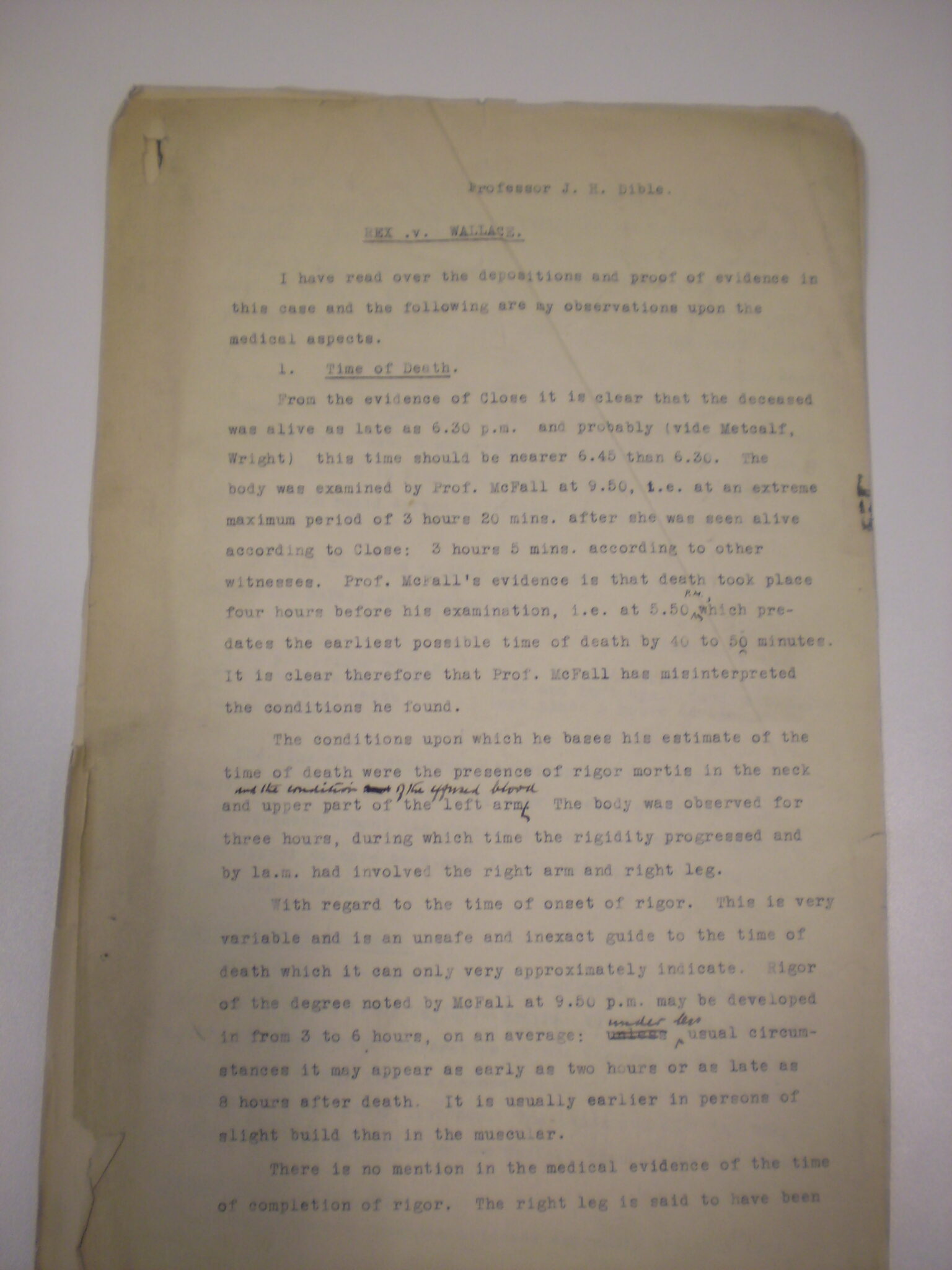
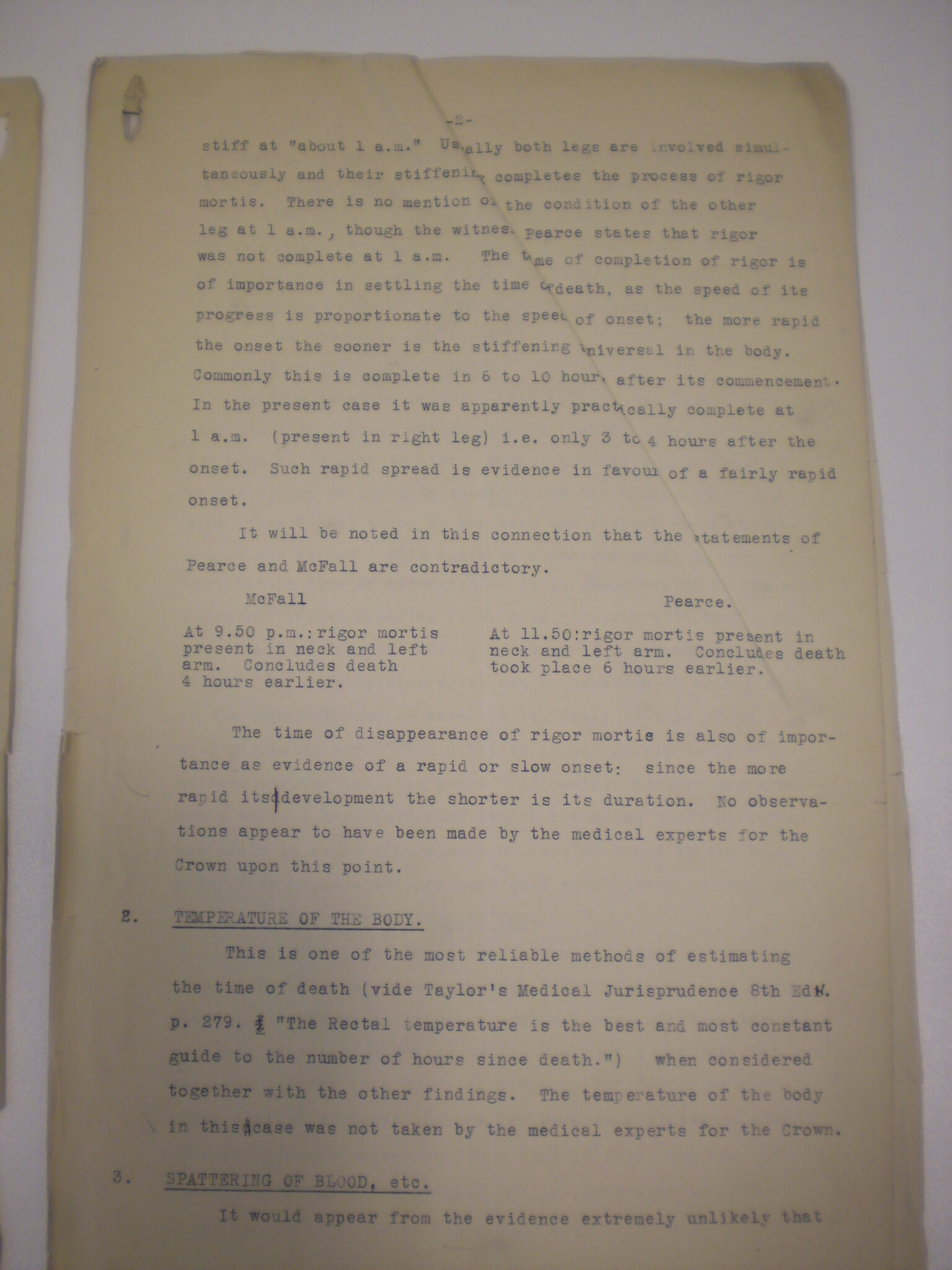
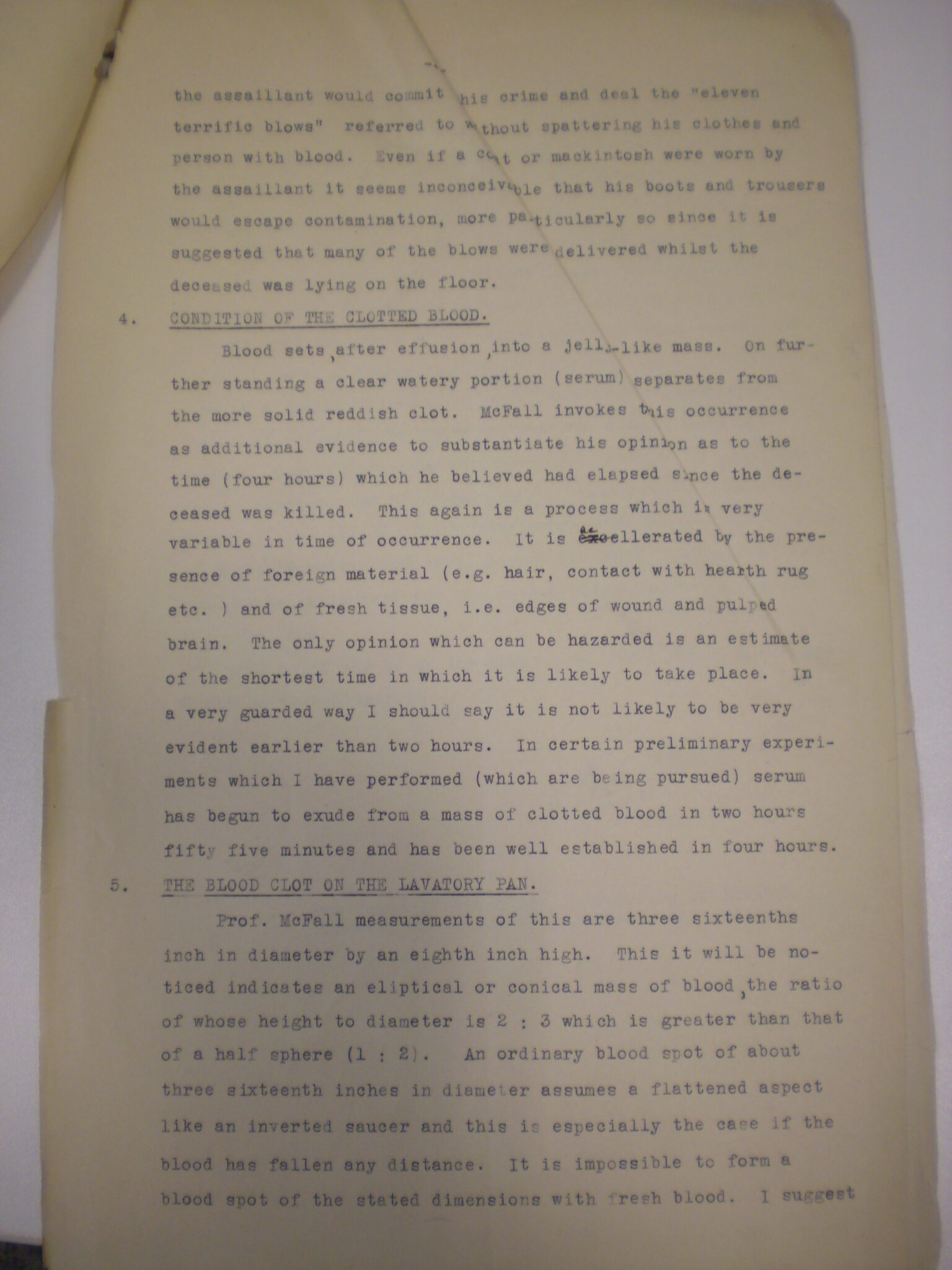
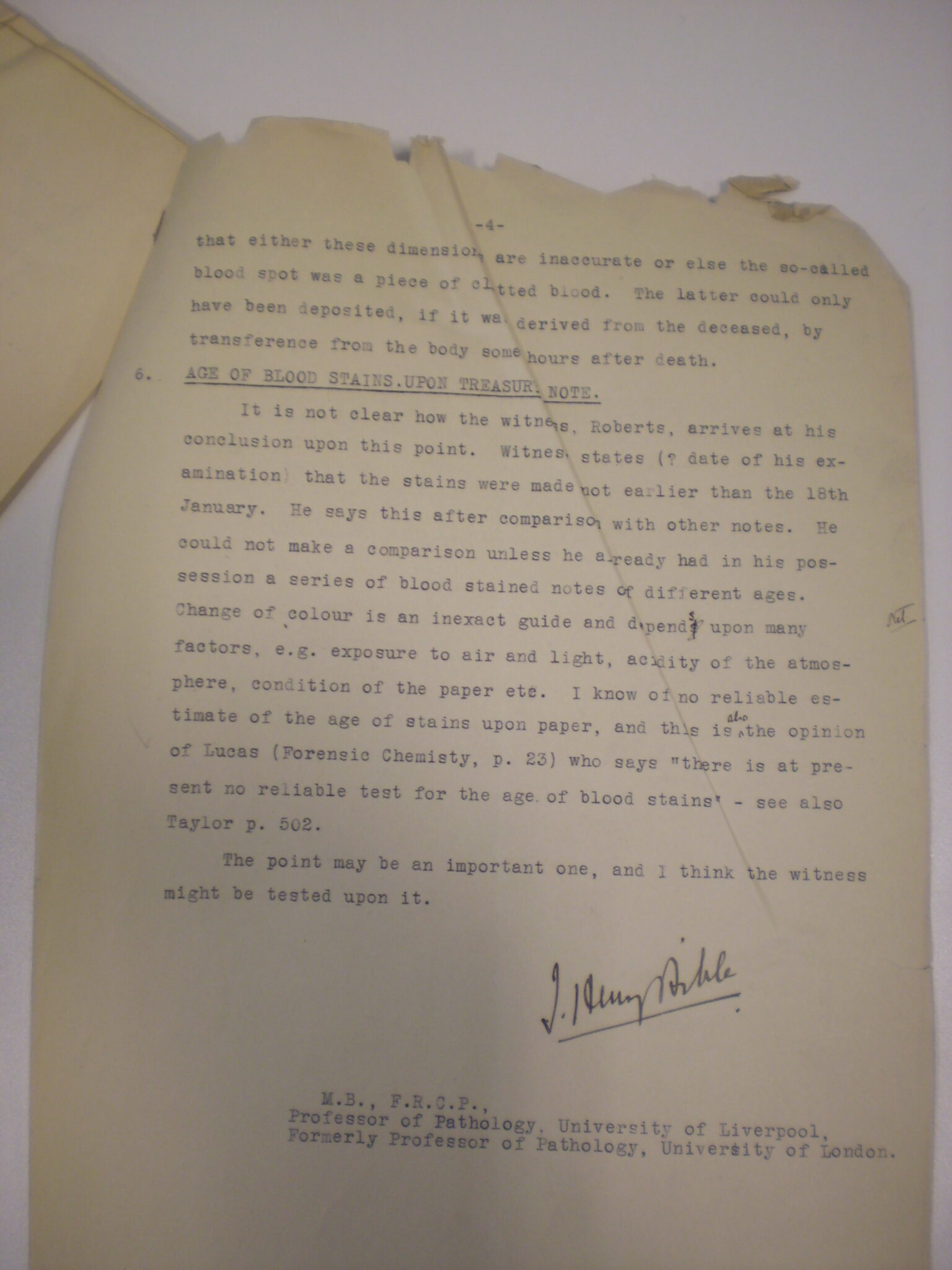
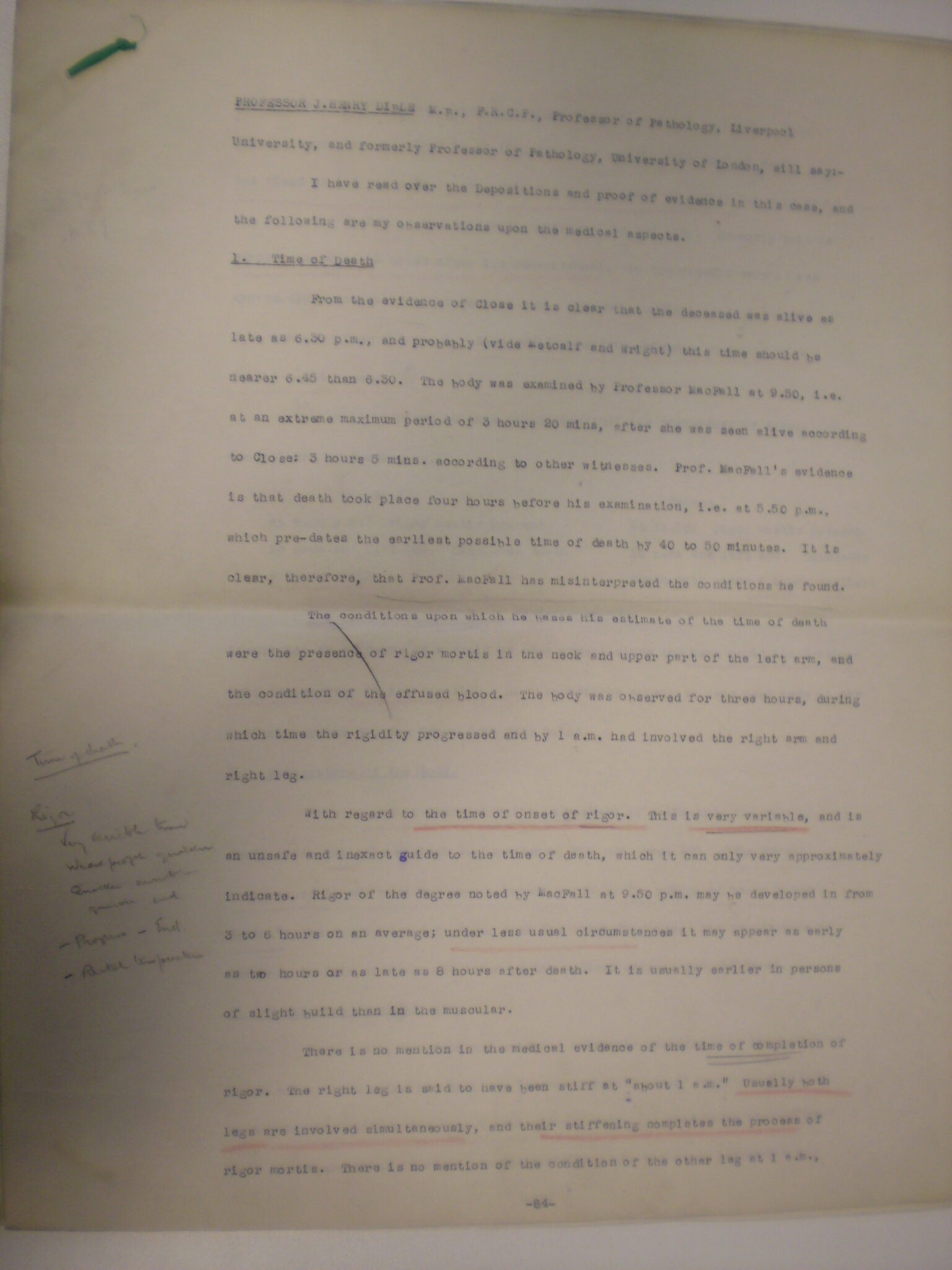
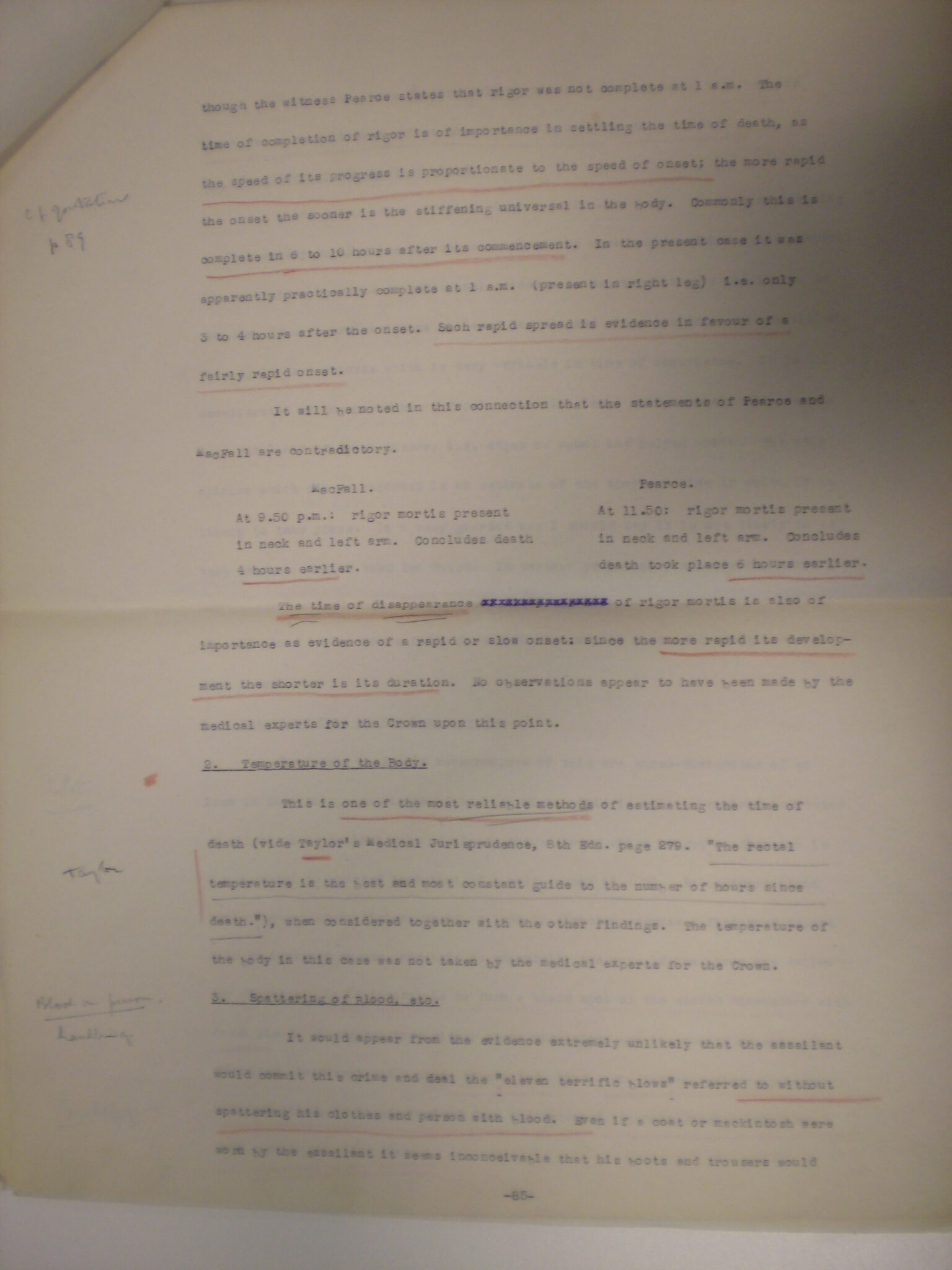
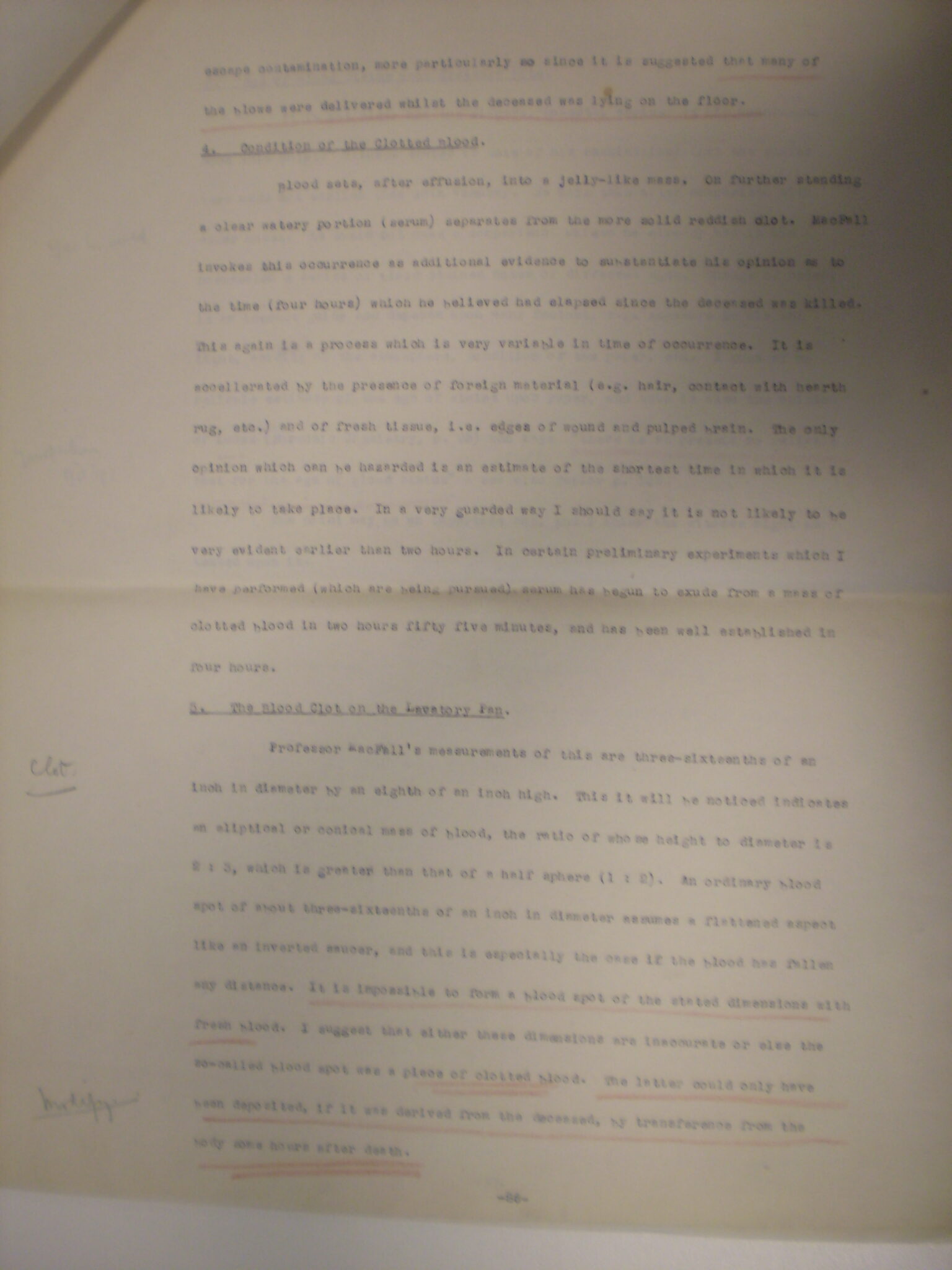
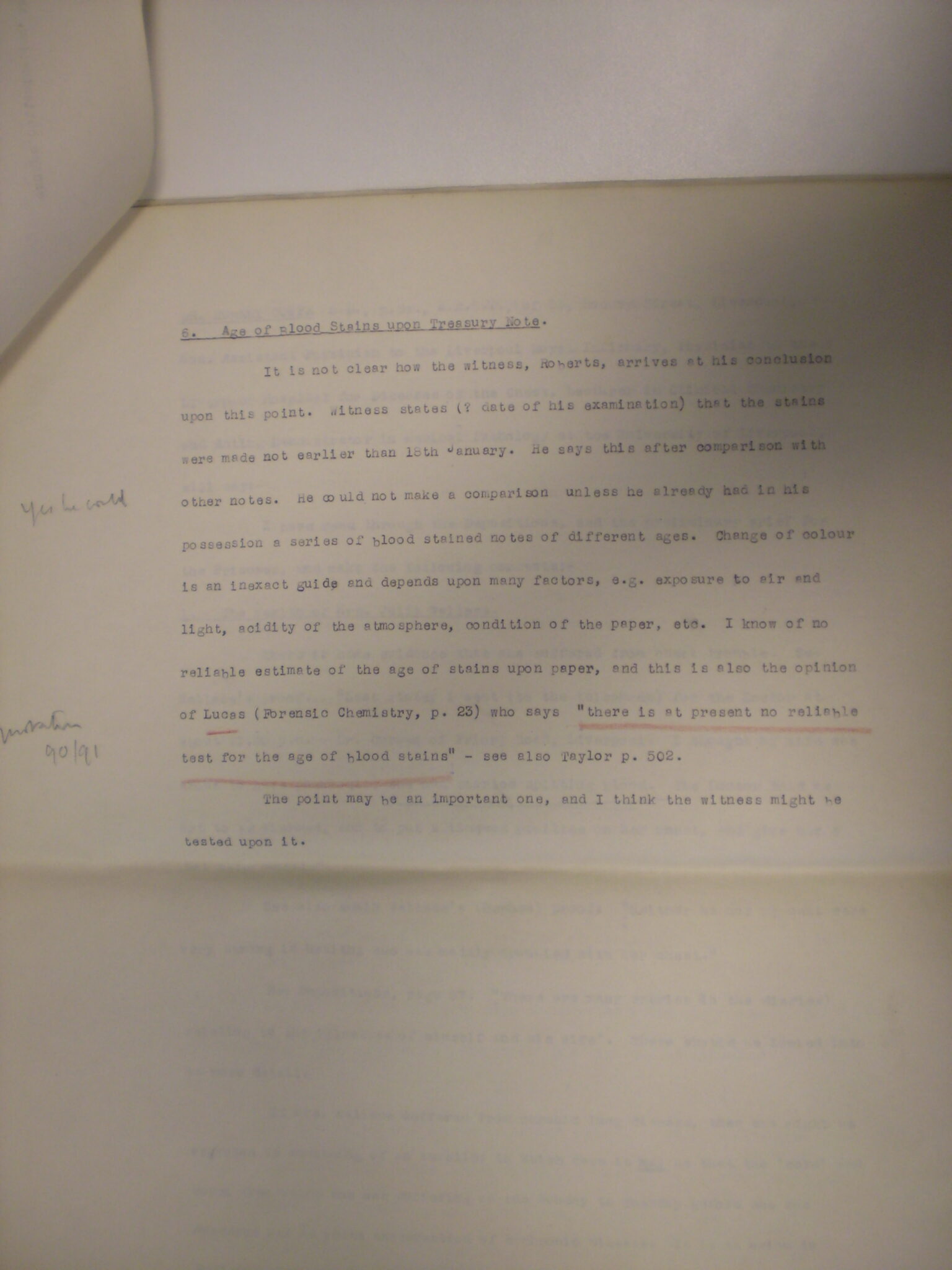
Nothing to do with the murder, but my cousin and his wife lived in Tyn Fynnon for a few years…